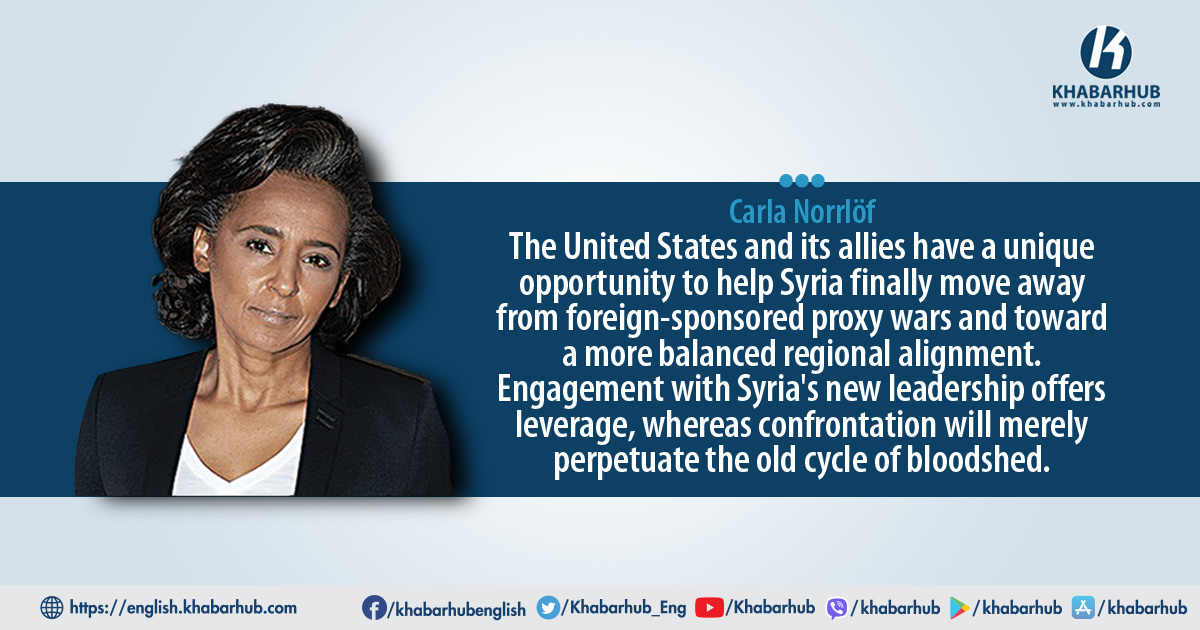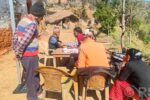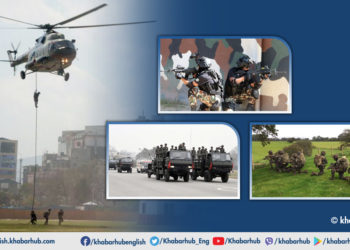After more than a decade of catastrophic civil war, the Assad dynasty’s abrupt collapse represents a moment of rebalancing, not only within Syria but across the Middle East.
With Iranian influence diminished, Russia preoccupied and overstretched, and Turkey quietly expanding its reach, the United States has come to a strategic juncture.
It can continue to pursue a policy of sanctions and military brinkmanship, or it can pivot to a more constructive form of engagement.
In this first phase, Syria will seek a new equilibrium. Russian forces, once entrenched in the heart of Syria’s security apparatus, drained by their own war in Ukraine, are effectively gone.
President Bashar al-Assad has fled to Russia, and the Kremlin is hoping to secure a deal with Syria’s new rulers, led by Hayat Tahrir al-Sham (HTS), to retain its Khmeimim air base in Latakia governorate and its naval facility at Tartus.
Iran, meanwhile, has also withdrawn its military assets, which were pummeled by Israeli strikes following Hamas’s October 7 invasion.
Military strikes might push HTS back into the arms of jihadist groups, undermine its domestic credibility, and fracture the nascent coalition holding the country together.
Its “axis of resistance,” which previously stretched from Tehran to the Mediterranean, has all but collapsed.
These developments have triggered a geopolitical scramble, with Turkey, Israel, and the US moving to secure their interests.
Turkey is seizing the moment to strike US-backed Kurdish forces along its border, viewing them as terrorists linked to the Turkey-based Kurdistan Workers’ Party (PKK).
It desperately wants to prevent the consolidation of an autonomous Kurdish region within northeastern Syria, as that could embolden Kurdish separatists at home.
Meanwhile, the US, determined to prevent a resurgence of the Islamic State, is targeting the remnants of terrorist groups in Syria.
Israel is expanding its occupation of the Golan Heights (which it seized from Syria in 1967) and conducting airstrikes on missile and chemical weapons sites.
The barrage continues to eliminate critical military capabilities, including fighter jets, radar and air defense installations, and naval vessels.
According to Israeli journalist Yoav Limor, “the damage surpasses the airstrike that launched the Six-Day War … effectively reducing [Syria] to a point of zero capability.”
While each power’s objectives differ, their swift moves highlight the challenges facing Syria’s new rulers.
The US, with its long fixation on counterterrorism, had previously designated HTS a terrorist organization, placing a $10 million bounty on its leader, Abu Mohammad al-Jolani.
US suspicions are not entirely unfounded, given that HTS’s lineage can be traced back to Syria’s al-Qaeda affiliate.
Yet the group claims to have reinvented itself politically, pledging a more inclusive, representative system.
Its rhetoric has focused on institution-building, and its takeover has been remarkably bloodless; when it reached Damascus, it peacefully escorted the prime minister, Mohammad Ghazi al-Jalali, out of office.
In his victory speech, Jolani addressed old grievances, decrying Iranian-fueled sectarianism and domestic corruption.
But he also expressed a willingness to break from his own radical roots. The logic of realpolitik was clear.
The rebel group now governs a war-ravaged country. It urgently needs legitimacy, foreign investment, and international recognition to stabilize Syria’s shattered economy, restore infrastructure, and provide basic public services.
In this context, it would be risky for the US to cling to outdated paradigms. While US policymakers have long sought to curb Iranian influence and limit Russia’s strategic foothold, it is HTS that has partly satisfied both objectives.
Rather than squandering this moment with knee-jerk bombing campaigns against a group that appears genuinely to have severed its ties to al-Qaeda, and could be further encouraged to move to civilian rule, the US should shift to a policy of engagement.
That means lifting the sanctions targeting Jolani and HTS’s top leadership, and signaling a willingness to negotiate and support Syrian reconstruction.
Such a move would not be a concession to extremism, but rather a carefully calibrated step to encourage moderation.
With the United Kingdom already preparing to reassess HTS’s terrorist designation, the US could coordinate with the UK and other European partners to create a conditions-based blueprint for diplomatic recognition and economic assistance.
Crucially, this should be tied to tangible benchmarks: inclusive governance, respect for minority rights, transparent elections, the dismantling of extremist networks, and full compliance with prohibitions on chemical weapons.
That is more than the US could have hoped for during the five-decade-long Assad regime.
Lifting the sanctions is not a concession but an overture to encourage moderation and support reconstruction under a unified coalition government.
Engagement will give the US more leverage than confrontation. Continuing to bomb or isolate Syria risks reinforcing the very extremism the West fears.
Military strikes might push HTS back into the arms of jihadist groups, undermine its domestic credibility, and fracture the nascent coalition holding the country together.
A heavy-handed approach also could create a power vacuum for Islamic State remnants to exploit.
By contrast, a diplomatic opening that relaxes punitive measures and opens channels of communication could encourage HTS leaders to usher in a more stable future in which reconstruction can take place.
Such a shift in US policy would reverberate strategically. By not allowing Russia or Iran to reassert their influence, the US could shape a scenario in which Syria finally moves away from foreign-sponsored proxy wars and toward a more balanced regional alignment.
Assad’s fall is not the end of Syria’s troubles, nor is HTS’s ascent a panacea. Deep structural problems remain, and the legacy of war, sectarian strife, and economic and environmental collapse cannot be easily overcome.
But the US has everything to gain from abandoning a reflexive policy of hostility and replacing it with strategic, conditions-based engagement.
This might, for instance, be achieved by granting limited Kurdish self-governance, while strictly ensuring border security and oversight to address Turkey’s legitimate concerns within a unified, stable Syrian framework.
Great-power politics in a post-Assad Syria will be defined by who recognizes the moment’s opportunities first.
For the US, that means lifting sanctions on Jolani, halting the airstrikes, and seizing the chance to shape a more stable, less polarized Middle East.
Lifting the sanctions is not a concession but an overture to encourage moderation and support reconstruction under a unified coalition government.
After 50 years of a brutal dictatorship that suppressed Syrians’ political and economic freedoms, the US must help them reclaim their own destiny.
(Carla Norrlöf, Professor of Political Science at the University of Toronto, is a non-resident senior fellow at the Atlantic Council)
Copyright: Project Syndicate









Comment